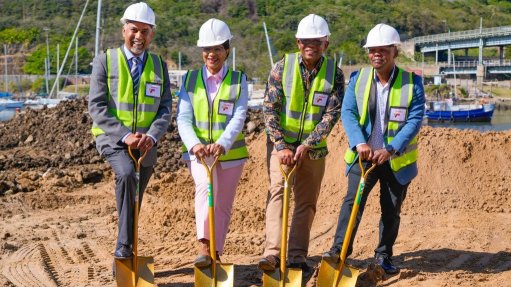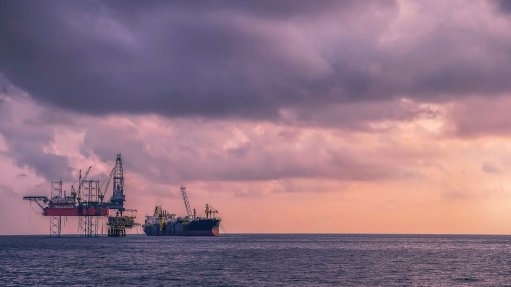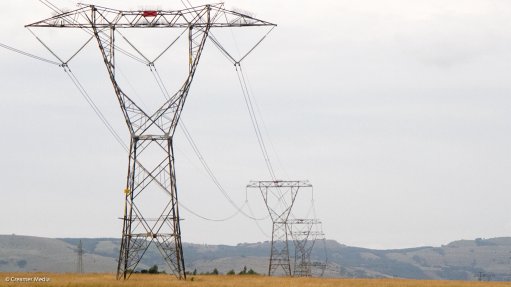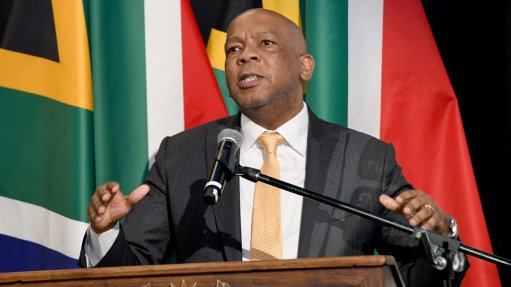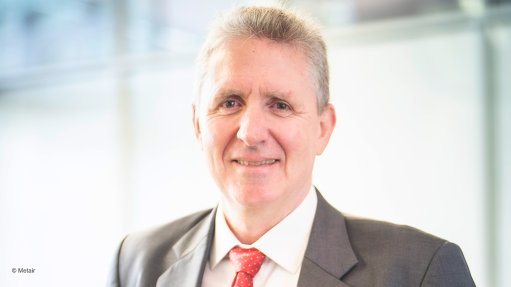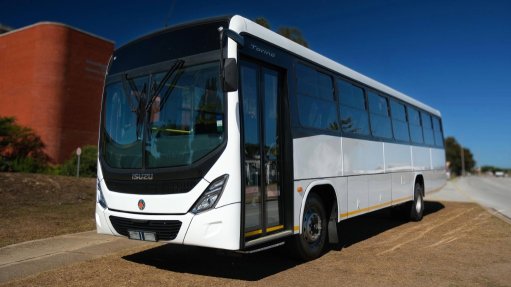CEF details Southern African oil, gas projects
State-owned energy company the Central Energy Fund (CEF) Group CEO Dr Ishmael Poolo this week highlighted oil and gas developments in Southern Africa, including discoveries of oil in Namibia, drilling for oil and gas in Zimbabwe, discoveries of and drilling for oil and gas off South Africa, as well as progress of its first commercial liquefied natural gas plant.
In February, energy and petrochemicals multinational Shell, through the Graff project, in Namibia, and energy multinational TotalEnergies, through the Venus project, also in Namibia, made significant discoveries of oil, in the Southern African Development Community region, he noted in a speech during African Energy Week.
TotalEnergies and its partners have also announced discoveries in blocks 11B and 12B off the coast of Mossel Bay over the past few years, said Poolo.
"On September 5, TotalEnergies lodged the production right application with our petroleum regulator. This demonstrates their commitment to invest and be part of developing the South Africa’s oil and gas sector. The country is fully committed to supporting TotalEnergies and partners as they advance this project forward," he added.
Further, oil and gas exploration company Eco (Atlantic) Oil & Gas, on August 12, mobilised a drilling rig to drill the Gazania-1 prospect Block 2B at the Orange basin offshore the west coast of the Northern Cape. The drilling campaign is expected to start soon and to target approximately 300-million barrels of light oil resources.
"This [project] further confirms companies’ commitment to invest in South Africa’s upstream oil and gas sector and assist government in its drive to address the socioeconomic challenges facing our country.
“As the regulators, we will be monitoring this development closely and offer to support Eco Atlantic to ensure delivery on its planned drilling programme," Poolo emphasised.
Meanwhile, upstream oil and gas company Invictus Energy expects to start drilling its first exploration well for oil and gas in the northern part of Zimbabwe, in the Mukuyu-1 prospect. The drilling campaign is expected to start this year, and it has been estimated that the Mukuyu-1 prospect will cost around $16-million. It is also part of Invictus’ Cahora Bassa project.
Locally, helium and domestic natural gas producer Renergen has recently announced that the Virginia Gas Project Plant, in the Free State, is operational and is beginning delivery to customers, he highlighted.
"The Virginia Gas Plant is South Africa’s first commercial LNG plant. This is a significant milestone in the country’s drive to reduce its carbon footprint. Through the CEF, government is in the process of acquiring 10% stake in the project by investing significant capital in this gas discovery.
"Africa, Southern Africa and South Africa are well endowed in energy sources that include coal, oil, gas, renewable energy, and associated mineral resources. Africa’s future prosperity depends in large part on solving the energy gaps, providing power that is affordable for the households and reliable power for businesses," Poolo stated.
In South Africa, the Quarterly Labour Force Survey for the first quarter of this year puts the unemployment rate at 64% for those aged 15 to 24, and 42% for those aged 25 to 34 years, while the current official national unemployment rate stands at 34.5%.
"Electricity shortages reduce the likelihood of an individual being employed in a high skilled job by 35% to 41% and of being self employed by 32% to 47%. Further, economists tell us that, to reduce unemployment by at least 1%, a country’s gross domestic product (GDP) must grow at above a 4% rate for one year.
"South Africa’s current and projected GDP growth levels, coupled with unreliable electricity supply, are not adequate to address the ticking timebomb that is youth employment. We must use all resources available and reach out to all players to address South Africa’s power challenges, including coal, oil, gas and renewables, as the basis of an energy-rich future," he emphasised.
Energy is the backbone of economic development. Evidence suggests a positive correlation between an increased generation capacity and economic growth. As economies grow, energy demand increases. If energy is constrained, GDP growth pulls back, Poolo said.
Additionally, the African Continental Free Trade Area agreement presents an opportunity to develop an integrated energy system. For South Africa, there lies an opportunity to import LNG into Coega and Richards Bay.
"CEF is at an advanced collaborative process with National Hydrocarbon Company ENH in Mozambique and with [energy and chemicals company] Sasol in South Africa to see this project through," he added.
Meanwhile, Poolo highlighted changes in energy policies around the world, including in Germany, which since the first quarter of this year, has restarted its mothballed coal-fired power plants to offset the reduction in supply of its natural gas from Russia, and is also extending the life of its nuclear power plants.
The UK is expected to announce dozens of new North Sea oil and gas exploration licences to boost domestic production.
"We have been witnessing changes in energy policies around the world regarding the use of fossil fuels, including coal, oil, gas and nuclear, which confirms countries commitment to pursue development of their indigenous resources for their own energy sovereignty and security.
"As Africans, we should remain committed to our goals to curb climate change; however, our ambitions should not stand in the way of our developmental imperatives, among them, ending poverty on our continent," Poolo stated.
CEF strongly supports gas to power as either baseload, mid-merit or peaking power plants, while South Africa maintains its old coal-fired power plants within the medium term.
"We should use renewables to complement the baseload and offset the emissions that come with installing these fossil fuel-based energy sources. We have looked closely at the US coal to gas switching trajectory, since 2005 - they have reported over 60% of emission reduction.
“As a country committed to the low carbon future, we are looking forward to build and or to convert more gas to power stations alongside other less emitting energy sources," he said.
Article Enquiry
Email Article
Save Article
Feedback
To advertise email advertising@creamermedia.co.za or click here
Comments
Press Office
Announcements
What's On
Subscribe to improve your user experience...
Option 1 (equivalent of R125 a month):
Receive a weekly copy of Creamer Media's Engineering News & Mining Weekly magazine
(print copy for those in South Africa and e-magazine for those outside of South Africa)
Receive daily email newsletters
Access to full search results
Access archive of magazine back copies
Access to Projects in Progress
Access to ONE Research Report of your choice in PDF format
Option 2 (equivalent of R375 a month):
All benefits from Option 1
PLUS
Access to Creamer Media's Research Channel Africa for ALL Research Reports, in PDF format, on various industrial and mining sectors
including Electricity; Water; Energy Transition; Hydrogen; Roads, Rail and Ports; Coal; Gold; Platinum; Battery Metals; etc.
Already a subscriber?
Forgotten your password?
Receive weekly copy of Creamer Media's Engineering News & Mining Weekly magazine (print copy for those in South Africa and e-magazine for those outside of South Africa)
➕
Recieve daily email newsletters
➕
Access to full search results
➕
Access archive of magazine back copies
➕
Access to Projects in Progress
➕
Access to ONE Research Report of your choice in PDF format
RESEARCH CHANNEL AFRICA
R4500 (equivalent of R375 a month)
SUBSCRIBEAll benefits from Option 1
➕
Access to Creamer Media's Research Channel Africa for ALL Research Reports on various industrial and mining sectors, in PDF format, including on:
Electricity
➕
Water
➕
Energy Transition
➕
Hydrogen
➕
Roads, Rail and Ports
➕
Coal
➕
Gold
➕
Platinum
➕
Battery Metals
➕
etc.
Receive all benefits from Option 1 or Option 2 delivered to numerous people at your company
➕
Multiple User names and Passwords for simultaneous log-ins
➕
Intranet integration access to all in your organisation






